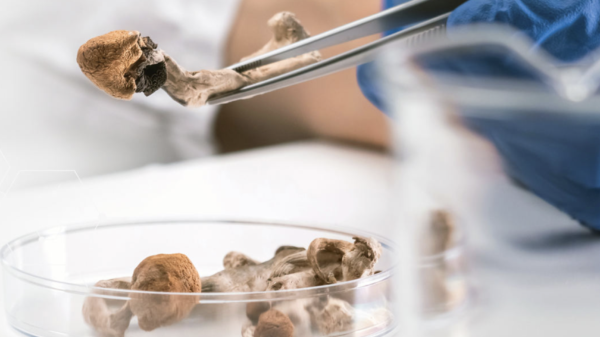Health Canada has issued a notice to stakeholders in the psychedelics industry, physicians, therapists and others regarding its future expectations for clinical trials and regulations for psychedelic-assisted therapy going forward.
The government department provided the guidance information on Monday due to a growing interest in the use of psychedelic-assisted psychotherapy and the inherent need to mitigate physical and psychological risks for participants involved in the studies.
In order for a clinical trial to proceed in the country, Health Canada must complete an assessment of risk management measures to determine whether it would be in the best interest of participants.
Read more: Psilocybin advocates protest in Ottawa demanding fair medical access
Read more: PsyCan aims to be ‘go-to’ psychedelics industry organization, receives support from lawmakers
Risk management measures, expectations for therapists and clinical environment standards
Due to the increased risk of psychological harm to participants and the sensitive nature of these treatments, Health Canada has outlined risk-management measures that it will require for all clinical trial applications (CTAs). It says companies/entities/sponsors must present a sufficient plan in adherence with those measures or a viable alternative risk-management strategy prior to commencing in-human studies with psychedelics.
Health Canada says it expects that all therapists involved with clinical trials will be adequately trained on evidence-based protocols for psychedelic-assisted psychotherapy and that they should be certified to provide psychotherapy by a regulatory body in their jurisdiction (if applicable).
The government department also says any unlicensed members of a therapy team involved with clinical trials should be under the direct supervision of a licensed therapist and that CTAs should have a comprehensive description of the qualifications of therapists who will be recruited for those studies.
Details regarding their credentials, certifications, licenses and previous training with psychedelic therapies should be stored in the applicable trial’s master file, according to Health Canada.
The rapport between those participating in the trials and the therapists overseeing them is also of critical importance and Health Canada says there should be sufficient therapy sessions before and after the administration of psychedelic drugs so that necessary trust can be built. Psychotherapy is necessary for the overall efficacy of psychedelic therapies and the integration process afterward.
Throughout the process where drugs are being administered to trial participants there should be at least two therapists present and a licensed physician overseeing the treatment, says Health Canada. The physician should also assist with screening potential participants to ensure they meet the eligibility criteria for receiving psychoactive drugs and have the authorization to administer those restricted drugs while offering medical care if needed.
Additionally, the physician can alter dosing regimens for participants depending on what they observe and feel is necessary. They should be clearly identified in the CTA because they assume liability for all medical acts performed throughout the studies.
Health Canada says a safe and comfortable environment is of the utmost importance when administering psychedelic drugs because it minimizes the risk of having negative reactions or psychological harm of any kind. Participants need to have the option to stay overnight where the therapy session is being held to help ensure their safety.
Those conducting clinical trials are responsible for reporting any serious adverse drug reactions to Health Canada. The government department says information on how to report any drastic or unexpected reactions to psychedelic drugs can be found in its Guidance Document for Clinical Trial Sponsors.
Read more: PharmAla and Mindset enter psilocybin distribution agreement
Read more: UBC psychedelics conference attracts multidisciplinary crowd with a shared passion
Health Canada requires informed consent
Health Canada says consent forms given to participants prior to undertaking psychedelic-assisted psychotherapy need to include a clear description of the physical and psychological risks associated with it.
“Depending on the drug used, the psychological risks may include an unpleasant psychological experience, emotional openness and suggestibility, disordered thoughts, destabilized mood, depression, suicidal thoughts and the transference and countertransference of feelings between the therapists and participants,” reads the notice.
Increased heart rate and higher blood pressure are examples of physical risks associated with the use of psychedelic medicines.
Those submitting clinical trial applications must include a statement outlining the risks and anticipated benefits for those participating in the studies and written consent must be acquired prior to commencing trials from every participant once they have been adequately informed of those risks and benefits.
Consent for touching participants must also be obtained prior to administering investigational drugs and Health Canada has specified that any physical contact been participants and therapists must be of an appropriate, non-sexual or intimate nature only.
Recording therapy sessions is only acceptable after receiving consent from participants to do so and they have the option to withdraw their consent at any time.
Health Canada says the psychedelic drugs that are used the most in the country’s clinical trials are psilocybin and MDMA. Those two drugs temporarily put participants into an altered state of consciousness which can last several hours.
“MDMA can cause an enhanced sense of well-being, increased extroversion, emotional warmth, empathy toward others, a willingness to discuss emotionally charged memories, enhanced energy, endurance, sociability, sexual arousal and sensory perception. It can also temporarily engender feelings of love and warmth,” reads the notice.
“The use of psilocybin can result in a distorted sense of reality, an altered sense of time, mood changes, anxiety, confusion or fear.”
Any investigational product or psychedelic drug used in Canadian clinical trials must meet Good Manufacturing Practices (GMP).
rowan@mugglehead.com












